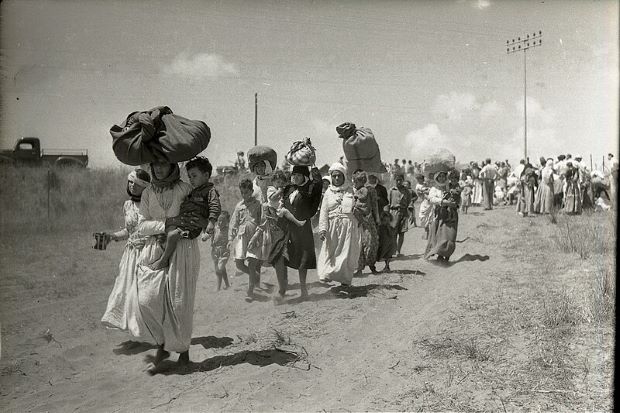May 15 in History
1948 –Over 700,000 Palestinian Arabs flee or are expelled from their homes in the area that became Israel, in what is referred to as the Nakba
The Nakba (‘the catastrophe’) was the ethnic cleansing of Palestinians in Mandatory Palestine during the 1948 Palestine war through their violent displacement and dispossession of land, property, and belongings, along with the destruction of their society, culture, identity, political rights, and national aspirations. The term is also used to describe the ongoing persecution and displacement of Palestinians by Israel. As a whole, it covers the fracturing of Palestinian society and the long-running rejection of the right of return for Palestinian refugees and their descendants.
During the Nakba in 1948, approximately half of Palestine’s predominantly Arab population, or around 750,000 people, were expelled from their homes or made to flee, at first by Zionist paramilitaries through various violent means, and after the establishment of the State of Israel, by the Israel Defence Forces. This occurred in the wake of dozens of massacres targeting Palestinian Arabs and the depopulation of 500 Arab-majority towns and villages, with many of these being either completely destroyed or repopulated by Jews and given new Hebrew names. By the end of the war, 78% of the total land area of the former Mandatory Palestine was controlled by Israel and at least 15,000 Palestinian Arabs had been killed.
The Palestinian national narrative views the Nakba as a collective trauma that defines their national identity and political aspirations, whereas the Israeli national narrative views the same events in terms of the war of independence that established their aspirations for statehood and sovereignty. To this end, the Palestinians observe May 15 as Nakba Day, commemorating the war’s events one day after Israel’s Independence Day. In 1967 following the Six-Day War, another series of Palestinian exodus occurred; this came to be known as the Naksa (lit. ’Setback’), and also has its own day, June 4.
The Nakba has greatly influenced Palestinian culture and is a foundational symbol of the current Palestinian national identity, together with the political cartoon character Handala, the Palestinian keffiyeh, and the Palestinian 1948 keys. Many books, songs, and poems have been written about the Nakba. Nakba denial remains prevalent despite the growing scholarship on it, such as those by the Israeli New Historians.
-Wikipedia



Comments are closed, but trackbacks and pingbacks are open.